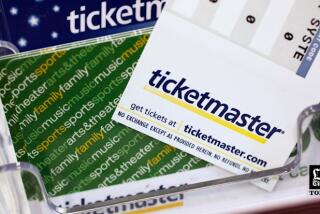Revalidation of Air Tickets Can Become Sticky
- Share via
Revalidation of air tickets puzzles some passengers. Other bolder travelers may attempt to use this method to bypass the conditions and restrictions of some fares.
Stickers which are provided by the Airline Reporting Corp. (ARC) save airlines and agents from rewriting the entire ticket and are used to change such flight details as the name of the airline, new flight number, date of departure, time of departure and the status of the ticket if the reservation has already been confirmed. The sticker is then pasted over the old information.
Revalidation should not be used for any other purpose. If the destination or type of fare is changed, the ticket should be rewritten.
Stickers With Numbers
Until last year, agents could get supplies of revalidation stickers from the airlines. However now the stickers come from the ARC with the agency’s ARC number on them which enables the carriers to track them back to the agency.
Abuses of the stickers still occur from time to time, though not as often as in the past. “Let’s say there’s a $1,200 regular round-trip fare from Los Angeles to London, and an agent offers it for a little less, maybe $1,000,” Brian Clewer of Ambassador International Travel explained. “The agent then issues a ticket on a 21-day advance over this ticket, with an earlier departure date than called for on the APEX ticket.”
Revalidation stickers have also been used to avoid paying surcharges on certain days or time periods during the week. According to Clewer, “The most common ploy is to bring a travel date forward against the rules of that particular fare.”
What if a passenger is caught with an improperly revalidated ticket?
That depends on the airline and the situation, Clewer said. “If the counter agents see a revalidation sticker, they should check it. But sometimes they’re busy. To avoid detection, some cunning passengers wait for a screaming mob around the counter before they come up with their revalidated ticket.”
Misuse Not Unusual
And according to another agent, Martha Scott, general manager of Glendale Travel, agents can now print out boarding passes and if a passenger has a boarding pass with his revalidated ticket he can sail right to the boarding gate where the airline agent just pulls the ticket, tears off half the boarding pass and no checking is done at all.”
However if you are found with such a misleading sticker, the airline will ask you to pay the difference. Using the $1,200 LAX-London fare, which was written on an APEX for $600, the passenger would be forced to pay the extra $600 to take that flight, Clewer says.
According to Vince Durocher, director of marketing for Delta Airlines, “When we check in the computer and find a difference in price, the passenger is asked to pay it. Passengers can also be asked to stand by for another flight, if they don’t qualify to fly under the conditions of their original ticket.”
The airlines may also eventually catch up to these abuses by matching coupons and sending the agent a debit memo.
“In some cases, agents may seek to recover the fare difference from their client,” Scott says.
“One scenario could have the client asking the agent if he could do a favor for him, with the agent then asking if the client would protect him if the airline found out. Sometimes the client is simply not advised of the possibility of being asked to pay more money at the airport or repaying the agent for the amount the agent has to pay the airline.”
Says Clewer: “I’ve had people come in with their own personal supply of revalidation stickers. Consumers were able to ask for and get a supply of stickers on request from agents, airlines or anyone else. And there was nothing wrong with this since the stickers were not then a controlled document like they are now.
“Some passengers ask us to put stickers on all the time, and they offer to reimburse us if a problem arises. However we don’t do it because the ultimate responsibility and liability is ours.”
International Flights
Generally, flight details on domestic tickets are changed without the use of revalidation stickers (unless a penalty situation is involved). But the circumstances are different on international flights, where the security implications and controls are stronger.
“Technically, an international ticket is supposed to be right when you present it at check-in,” Clewer said. “Domestically the airlines don’t care as much as long as the information has been changed in the airline’s computer.
“One of the things security personnel look for, as part of profiles of potentially dangerous passengers, are people who buy tickets to travel in two or three weeks but then try to fly sooner.”
If you want to change a flight detail, you can phone in a change and your travel agent/airline will record the change on the computer.
But ostensibly, on an international ticket at least, you have to take the ticket to the travel agent that issued the ticket or the airline’s city ticket offices to have it revalidated. This service is free with the airline, but some travel agents may charge a service fee.
“Although stickers are still occasionally used for nefarious purposes, the situation used to be worse,” Clewer said. “Until last year, there were even more abuses. Agents used to be able to get a whole box of stickers from individual airlines. Now issued by the ARC, they’re not so easy to get.”
As a general point of advice: Never buy a revalidated ticket. Clewer said: “If it’s an original ticket, there’s no reason for it to be revalidated. It suggests that some game is being played.”
More to Read
Sign up for The Wild
We’ll help you find the best places to hike, bike and run, as well as the perfect silent spots for meditation and yoga.
You may occasionally receive promotional content from the Los Angeles Times.






